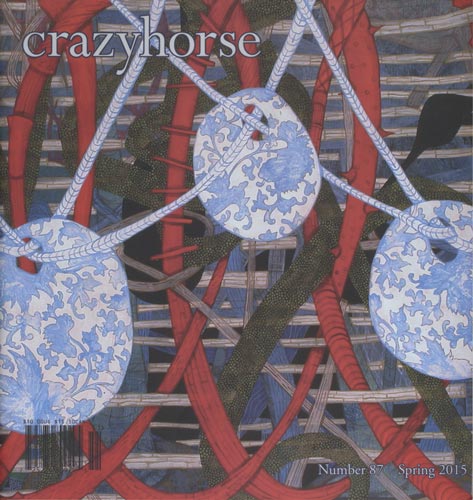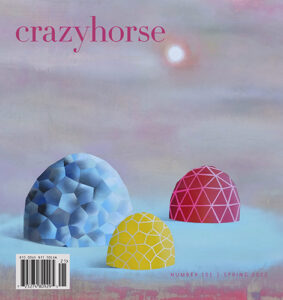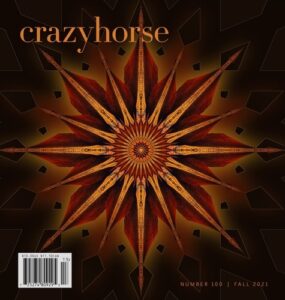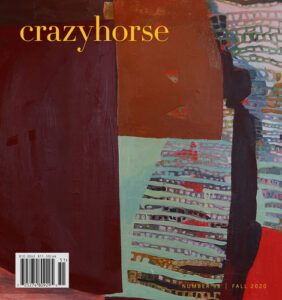Crazyhorse – Spring 2015
Perhaps my favorite poem in this issue of Crazyhorse is the “Poem for the Giraffe Marius,” written by Christopher Kempf. The poem details the death of Marius, a giraffe who was executed via a bolt gun at the Copenhagen Zoo, “Because they said genetics [ . . . ] inbreeding. Because when the steel bolt retracts, the giraffe’s / skull crumpling // on itself like a cup.” Kempf continues, “There is [ . . . ] an element / of cruelty rooted in every spectacle.” Perhaps my favorite poem in this issue of Crazyhorse is the “Poem for the Giraffe Marius,” written by Christopher Kempf. The poem details the death of Marius, a giraffe who was executed via a bolt gun at the Copenhagen Zoo, “Because they said genetics [ . . . ] inbreeding. Because when the steel bolt retracts, the giraffe’s / skull crumpling // on itself like a cup.” Kempf continues, “There is [ . . . ] an element / of cruelty rooted in every spectacle.”
This issue features multiple poems by Sherod Santos. The first poem “How Long Did It Feel like Burning” captures the “ecstasis,” the moment when one stands outside of their self, “like a vacuum / sack of blood / the milliliter scale / on the clouding barrel of a locked syringe.” The second poem, “In White Youth,” Santos writes, “a renaissance lifted a firebrand to our age // our fetish from / the mouth of the barrier bridges poured.”
Alexandra Daley, in her poem “Survival Instinct,” in which “The moon is a mere suggestion—scribbled light on a depressed sky—.” The narrator, who turns to the forest as an escape from the human side that sets us apart from animals, ends by projecting the human onto the natural, where “The moon’s face is carved of bone.” In her poem “Manhattan,” Daley captures a moment in city life where “Guilt is energy cranked / through the body, transformed into check marks.”
In “Genesis 8:21,” R.A. Villanueva captures the moment boy finds “a finch broken open, / its heart all glossy with the wings / of flies.” Rochelle Hurt, in her poem “Fourteen,” articulates the age in which “we dig little graves in our minds.” In “Self-Portrait with Nightfall,” Katherine Coles struggles with “congenital absence” in which “your heart needs // To beat in synchrony. Mutter all you want: in this / You are different from nobody.”
In fiction, Erika Krouse writes, in her story “Wounds of the Heart and Great Vessels,” about the experience of a floor sales woman’s brief relationship with an anesthesiologist who suffers the death of a patient, and how she struggles to save the man from his own grief. In this piece, anesthesia is “a taste of death. When we come alive again, we’re relieved of our worst memories” much like the doctor after his revival from grief.
“DNR,” a provocative piece by Dennis James Sweeny, is about a man who is saved by a jogger, even though his medical card says Do Not Resuscitate. When the main character, Manse, awakens in the hospital, his observation, “Only the sun outside the broad white blinds which are always calibrated in such a way as to misrepresent the time of day,” is relatable to anyone who has ever been in a hospital room. “DNR” is half narrative from the point of view of the main character and half response column for an interview of the jogger.
In “Ceci N’est Pas About You,” Joseph O’Malley captures Pipedreamer’s struggles with capitalism in modern America as big businesses continually replace small corner stores causing “the diminishing of variety in the world, the effacing of quirk.” “Ceci N’est Pas About You,” which translates to “This is not about you,” for those readers who, like me, struggle with French, borrows its title, and more, from “The Treachery of Images,” a painting by Rene Magritte of a pipe featuring the line “ceci n’est pas une pipe”—this is not a pipe.
In nonfiction Lawrence Sutin pens “Can We Choose Parts of Ourselves to Change? Asked My Daughter Sarah,” in which he responds “the mortal coils are us,” and “the absence of pain makes them afraid. So when an old pain goes away they bite to cause a new one.” We can chose parts of ourselves to change but that doesn’t mean we should.
In her piece “Coins,” Garnett Kilberg Cohen relays a time when she was young and lived next to a strange older woman and her rough relationship with her son. On their last meeting, the neighbor’s son leaves a stack of coins on a table for the narrator who “see[s] the columns of sparkling coins, like a futuristic city of gleaming silver towers in the rapidly approaching distance.”
This issue of Crazyhorse also features the winner and runners up for the Crazyshorts contest. Contest winner, Emily Pease’s piece “Foods of the Bible,” briefly iterates a Sunday school lesson in which one is either the wheat or the chaff. Runners up feature the pieces “The Exterminator” by Landon Houle, “Sick Day” by Caitlin Scarano, and “Matt’s Comics” by Lee Conell.
With a firm grip on the complications of life and survival, the 87th issue of Crazyhorse is perfect for any journey.
[crazyhorse.cofc.edu]




